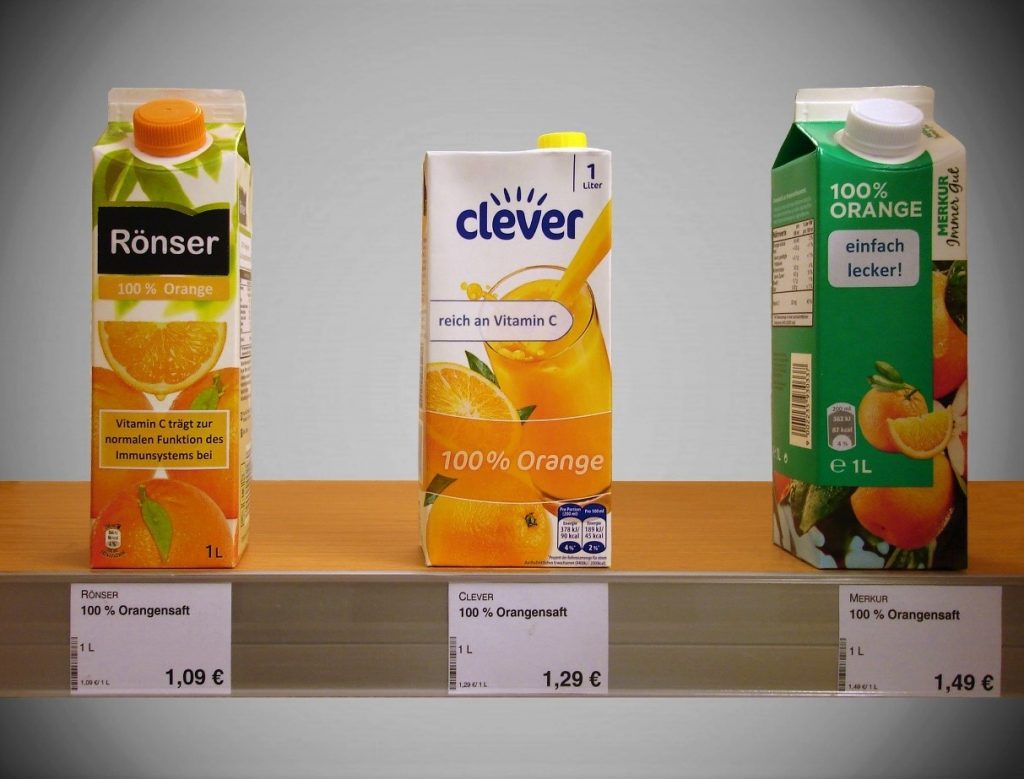By Meike Janssen
In a recent study, colleagues from the University of Kassel, Germany and me discovered that consumers fall for food products with nutrition claims on the package front.
Nutrition claims?
Nutrition claims are short claims highlighting a particular beneficial nutritional property, e.g. fat-free, high protein, or rich in vitamin C. In the study, we sent consumers shopping in a laboratory supermarket with real products on the shelf. The interesting fact: Consumers could choose between three orange juices with identical nutritional profiles; only that one orange juice carried the nutrition claim rich in vitamin C. And this was the orange juice most consumers bought, even though the other two orange juices contained the same amount of vitamin C (for details about the experiment, which claims were tested, and how the claims rotated across the brands, see the end of this post).
Interestingly, all types of consumers fell for the orange juice with the nutrition claim: consumers seeking for healthy products as well as consumers not caring about healthy products; consumers who knew a lot about nutrition as well as those who knew relatively little about nutrition.

You might wonder: Is it allowed to prominently highlight, on the package front, an ingredient that is typically included in all products of a certain type? For vitamin C in 100% orange juice, the answer is yes.
The good and bad news
The good news is: EU law stipulates the conditions under which nutrition claims are allowed. So nutrition claims can generally be considered trustworthy. The bad news is: A nutrition claim does not mean the product is overall healthy. A nutrition claim only refers to a single ingredient.
>>For instance, it is allowed to label candy containing high amounts of sugar as fat-free. If you ask me, that is a problematic issue. <<
Are consumers stupid or irrational?
How come consumers can be ‘manipulated’ so easily, by simply highlighting one beneficial ingredient that is, in fact, in all 100% orange juices? Is it because consumers are stupid and know little about vitamin C in orange juice? No, that would not explain why even consumers with a high nutrition knowledge fell for the product with the nutrition claim. Then is it because consumers behave irrationally when they do grocery shopping? Again, the answer is no.

Consumers look for simple heuristics when choosing between similar food products. When grocery shopping, we are confronted with a lot of information. Since most of us do not want to spend hours in the supermarket comparing several products and reading all information on product packages, we use ‘cues’ that help us navigate through the information jungle.
Every consumer has his/her own cues that he/she uses, often subconsciously. These cues simplify our choice tasks and allow us to make quick decisions. And the important thing is: in the end, we are usually quite happy with our product choice. Most of us walk out of the supermarket and do not worry about whether we really made the best possible choice. So in that sense, relying on simple choice heuristics and using cues like ingredients, brand and price makes perfect sense for us, at least when we do grocery shopping. There is nothing irrational about it.
Take-home message: Better check nutritional information
Whether or not you want to use nutrition claims as one of ‘your cues’ when choosing food, remains your own decision. Just bear in mind the following: Only because one brand highlights that the product contains a beneficial ingredient, does not mean other similar products do not have the same benefits. And only because a product carries a nutrition claim, does not mean the product is healthy – it might contain high amounts of other unhealthy ingredients.
If you are really interested in buying a nutritious product, better check the nutritional information on the back of the package and compare several products. You might find a product with better nutritional properties without a nutrition claim on the front.
Details about the experiment
The study participants were recruited in the pedestrian area in the city of Kassel, Germany. The 156 participants went shopping in a laboratory supermarket. They could choose between three orange juices, each of which labelled with a claim:
- taste claim ‘simply delicious’,
- health claim ‘Vitamin C contributes to the normal function of the immune system’, or
- nutrition claim ‘rich in vitamin C’.
To make the purchase simulation as realistic as possible, existing brands and products were offered on the shelf. We only added the claims. The products were from other German speaking countries (Austria and Switzerland) so that the participants were not familiar with them. We wanted to rule out strong brand effects. Across the sample, the three claims rotated among the three brands.
The study results are published in two journal articles:
- Johann Steinhauser; Meike Janssen; Ulrich Hamm (2019). Consumers’ Purchase Decisions for Products with Nutrition and Health Claims: What Role Do Product Category and Gaze Duration on Claims Play? In: Appetite, Vol. 141, 1 October 2019, 104337, https://doi.org/10.1016/j.appet.2019.104337
- Johann Steinhauser; Meike Janssen; Ulrich Hamm (2019). Who Buys Products with Nutrition and Health Claims? A Purchase Simulation with Eye Tracking on the Influence of Consumers’ Nutrition Knowledge and Health Motivation. Nutrients, Vol. 11, No. 9, 12.9.2019, https://doi.org/10.3390/nu11092199
About the Author
Meike Janssen is Associate Professor for Sustainable Consumption and Behavioural Studies, CBS Sustainability, Copenhagen Business School
Photo by Joshua Rawson-Harris on Unsplash
Further reading: Let Me Lend You a Hand: How Behavioural Economics Can Restore Trust in Science
